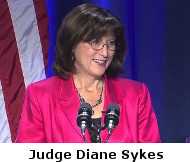Article from: www.thenewspaper.com/news/64/6400.asp
2/15/2018
Federal Appeals Court Laughs At Ex-Redflex Exec Demand For Reward
US Court of Appeals judges laugh at attempt of former Redflex executive to collect a reward in bribery scheme.
 A three-judge federal panel on Tuesday mocked the notion that the mastermind of a red light camera bribery scheme is entitled to a multimillion-dollar reward for his efforts. In oral arguments before the Seventh Circuit US Court of Appeals, former Redflex executive vice president Aaron M. Rosenberg insisted that he was entitled to a statutory payment as the whistleblower responsible for exposing the red light camera corruption in Chicago, Illinois.
A three-judge federal panel on Tuesday mocked the notion that the mastermind of a red light camera bribery scheme is entitled to a multimillion-dollar reward for his efforts. In oral arguments before the Seventh Circuit US Court of Appeals, former Redflex executive vice president Aaron M. Rosenberg insisted that he was entitled to a statutory payment as the whistleblower responsible for exposing the red light camera corruption in Chicago, Illinois.
A lower court trial judge saw things differently, finding the Chicago Tribune had much more to do with bringing down the Redflex scheme than Rosenberg. The appellate judges felt the same way, telling Michael Williams, the former red light camera executive's lawyer, that they were not convinced by his arguments.
"There's a lot more than news stories," Judge Diane S. Sykes said. "We've got the Tribune exposes. We've got the... the OIG investigation. That combination of public disclosures encompasses the totality of this fraudulent scheme in which your client was culpable and a co-conspirator. So apart from the audacity of this claim, there are many legal impediments."
Williams countered that the whistleblower statute explicitly accounts for the possibility that a criminal would claim a reward for exposing city hall corruption by volunteering information. A judge is given discretion to reduce the amount of the award if he believes the whistleblower is unworthy of the full amount.
"The judge here was very clear that he thought your client deserved nothing," Judge Sykes fired back. "So [that's] another reason why you lose."
Judge Amy C. Barrett joined the discussion by questioning whether anything Rosenberg did could be considered "voluntary" or worthy of the term whistleblower. She pointed out that he took the call from investigators, as opposed to taking the initiative to call the inspector general to inform on the Australian red light camera company's illegal conduct.
Rosenberg's lawyer insisted that unless criminals saw the possibility of collecting a reward there would be no whistleblowing. The judges suggested that the prospect of a reward was not what motivated Rosenberg.
"He only spilled his guts when he had to, to save his skin from criminal prosecution pursuant to an immunity agreement with the US attorney," Judge Sykes said.
Redflex lawyer Steve Weiss agreed that none of the $20 million fine that his firm is paying to Chicago should not be shared with Rosenberg. He argued that all of the essential elements in the prosecution of his company could be found in the Chicago Tribune.
"So what was known?" the Redflex lawyer asked. "By the time the complaint was filed, it was already public knowledge that Redflex and [John] Bills had a long-standing bribery scheme, involving Redflex bribing Bills to obtain the Chicago contract; and ongoing bribery of Bills funneled through his friend [Martin] O'Malley to maintain and expand the program. All of that was publicly disclosed."
If the appellate panel ultimately rules against Rosenberg, he has the option to file for an "en banc" appeal to all of the Seventh Circuit judges.
 A three-judge federal panel on Tuesday mocked the notion that the mastermind of a red light camera bribery scheme is entitled to a multimillion-dollar reward for his efforts. In oral arguments before the Seventh Circuit US Court of Appeals, former Redflex executive vice president Aaron M. Rosenberg insisted that he was entitled to a statutory payment as the whistleblower responsible for exposing the red light camera corruption in Chicago, Illinois.
A three-judge federal panel on Tuesday mocked the notion that the mastermind of a red light camera bribery scheme is entitled to a multimillion-dollar reward for his efforts. In oral arguments before the Seventh Circuit US Court of Appeals, former Redflex executive vice president Aaron M. Rosenberg insisted that he was entitled to a statutory payment as the whistleblower responsible for exposing the red light camera corruption in Chicago, Illinois.